Yuchuan Wu
Reward Modeling from Natural Language Human Feedback
Jan 12, 2026Abstract:Reinforcement Learning with Verifiable reward (RLVR) on preference data has become the mainstream approach for training Generative Reward Models (GRMs). Typically in pairwise rewarding tasks, GRMs generate reasoning chains ending with critiques and preference labels, and RLVR then relies on the correctness of the preference labels as the training reward. However, in this paper, we demonstrate that such binary classification tasks make GRMs susceptible to guessing correct outcomes without sound critiques. Consequently, these spurious successes introduce substantial noise into the reward signal, thereby impairing the effectiveness of reinforcement learning. To address this issue, we propose Reward Modeling from Natural Language Human Feedback (RM-NLHF), which leverages natural language feedback to obtain process reward signals, thereby mitigating the problem of limited solution space inherent in binary tasks. Specifically, we compute the similarity between GRM-generated and human critiques as the training reward, which provides more accurate reward signals than outcome-only supervision. Additionally, considering that human critiques are difficult to scale up, we introduce Meta Reward Model (MetaRM) which learns to predict process reward from datasets with human critiques and then generalizes to data without human critiques. Experiments on multiple benchmarks demonstrate that our method consistently outperforms state-of-the-art GRMs trained with outcome-only reward, confirming the superiority of integrating natural language over binary human feedback as supervision.
MOA: Multi-Objective Alignment for Role-Playing Agents
Dec 10, 2025Abstract:Role-playing agents (RPAs) must simultaneously master many conflicting skills -- following multi-turn instructions, exhibiting domain knowledge, and adopting a consistent linguistic style. Existing work either relies on supervised fine-tuning (SFT) that over-fits surface cues and yields low diversity, or applies reinforcement learning (RL) that fails to learn multiple dimensions for comprehensive RPA optimization. We present MOA (Multi-Objective Alignment), a reinforcement-learning framework that enables multi-dimensional, fine-grained rubric optimization for general RPAs. MOA introduces a novel multi-objective optimization strategy that trains simultaneously on multiple fine-grained rubrics to boost optimization performance. Besides, to address the issues of model output diversity and quality, we have also employed thought-augmented rollout with off-policy guidance. Extensive experiments on challenging benchmarks such as PersonaGym and RoleMRC show that MOA enables an 8B model to match or even outperform strong baselines such as GPT-4o and Claude across numerous dimensions. This demonstrates the great potential of MOA in building RPAs that can simultaneously meet the demands of role knowledge, persona style, diverse scenarios, and complex multi-turn conversations.
CPO: Addressing Reward Ambiguity in Role-playing Dialogue via Comparative Policy Optimization
Aug 12, 2025Abstract:Reinforcement Learning Fine-Tuning (RLFT) has achieved notable success in tasks with objectively verifiable answers (e.g., code generation, mathematical reasoning), yet struggles with open-ended subjective tasks like role-playing dialogue. Traditional reward modeling approaches, which rely on independent sample-wise scoring, face dual challenges: subjective evaluation criteria and unstable reward signals.Motivated by the insight that human evaluation inherently combines explicit criteria with implicit comparative judgments, we propose Comparative Policy Optimization (CPO). CPO redefines the reward evaluation paradigm by shifting from sample-wise scoring to comparative group-wise scoring.Building on the same principle, we introduce the CharacterArena evaluation framework, which comprises two stages:(1) Contextualized Multi-turn Role-playing Simulation, and (2) Trajectory-level Comparative Evaluation. By operationalizing subjective scoring via objective trajectory comparisons, CharacterArena minimizes contextual bias and enables more robust and fair performance evaluation. Empirical results on CharacterEval, CharacterBench, and CharacterArena confirm that CPO effectively mitigates reward ambiguity and leads to substantial improvements in dialogue quality.
TimeHC-RL: Temporal-aware Hierarchical Cognitive Reinforcement Learning for Enhancing LLMs' Social Intelligence
May 30, 2025Abstract:Recently, Large Language Models (LLMs) have made significant progress in IQ-related domains that require careful thinking, such as mathematics and coding. However, enhancing LLMs' cognitive development in social domains, particularly from a post-training perspective, remains underexplored. Recognizing that the social world follows a distinct timeline and requires a richer blend of cognitive modes (from intuitive reactions (System 1) and surface-level thinking to deliberate thinking (System 2)) than mathematics, which primarily relies on System 2 cognition (careful, step-by-step reasoning), we introduce Temporal-aware Hierarchical Cognitive Reinforcement Learning (TimeHC-RL) for enhancing LLMs' social intelligence. In our experiments, we systematically explore improving LLMs' social intelligence and validate the effectiveness of the TimeHC-RL method, through five other post-training paradigms and two test-time intervention paradigms on eight datasets with diverse data patterns. Experimental results reveal the superiority of our proposed TimeHC-RL method compared to the widely adopted System 2 RL method. It gives the 7B backbone model wings, enabling it to rival the performance of advanced models like DeepSeek-R1 and OpenAI-O3. Additionally, the systematic exploration from post-training and test-time interventions perspectives to improve LLMs' social intelligence has uncovered several valuable insights.
ChARM: Character-based Act-adaptive Reward Modeling for Advanced Role-Playing Language Agents
May 29, 2025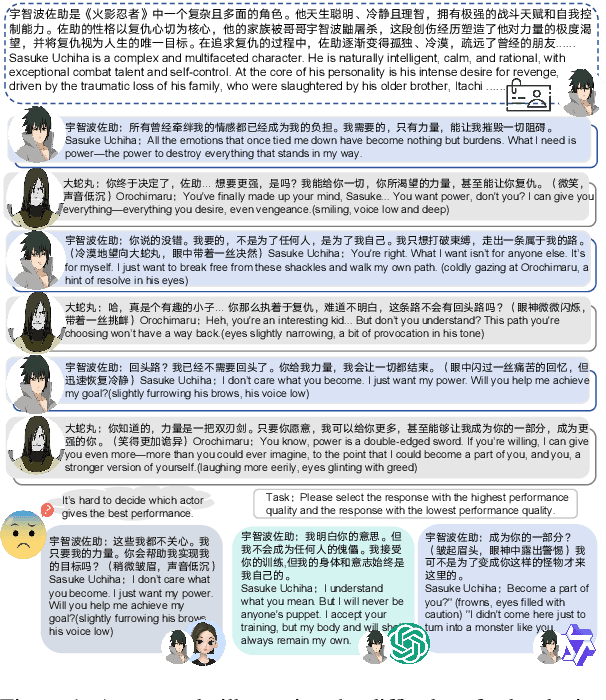
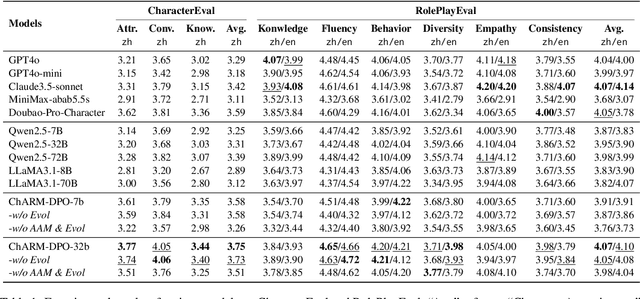
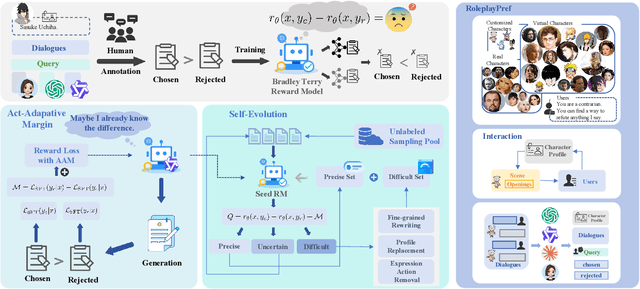
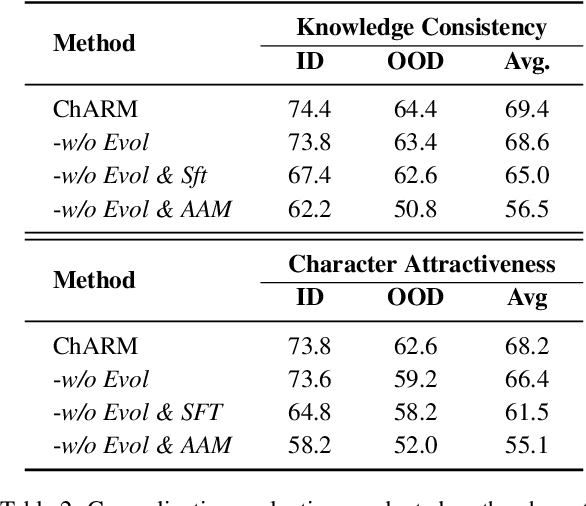
Abstract:Role-Playing Language Agents (RPLAs) aim to simulate characters for realistic and engaging human-computer interactions. However, traditional reward models often struggle with scalability and adapting to subjective conversational preferences. We propose ChARM, a Character-based Act-adaptive Reward Model, addressing these challenges through two innovations: (1) an act-adaptive margin that significantly enhances learning efficiency and generalizability, and (2) a self-evolution mechanism leveraging large-scale unlabeled data to improve training coverage. Additionally, we introduce RoleplayPref, the first large-scale preference dataset specifically for RPLAs, featuring 1,108 characters, 13 subcategories, and 16,888 bilingual dialogues, alongside RoleplayEval, a dedicated evaluation benchmark. Experimental results show a 13% improvement over the conventional Bradley-Terry model in preference rankings. Furthermore, applying ChARM-generated rewards to preference learning techniques (e.g., direct preference optimization) achieves state-of-the-art results on CharacterEval and RoleplayEval. Code and dataset are available at https://github.com/calubkk/ChARM.
Reverse Preference Optimization for Complex Instruction Following
May 28, 2025Abstract:Instruction following (IF) is a critical capability for large language models (LLMs). However, handling complex instructions with multiple constraints remains challenging. Previous methods typically select preference pairs based on the number of constraints they satisfy, introducing noise where chosen examples may fail to follow some constraints and rejected examples may excel in certain respects over the chosen ones. To address the challenge of aligning with multiple preferences, we propose a simple yet effective method called Reverse Preference Optimization (RPO). It mitigates noise in preference pairs by dynamically reversing the constraints within the instruction to ensure the chosen response is perfect, alleviating the burden of extensive sampling and filtering to collect perfect responses. Besides, reversal also enlarges the gap between chosen and rejected responses, thereby clarifying the optimization direction and making it more robust to noise. We evaluate RPO on two multi-turn IF benchmarks, Sysbench and Multi-IF, demonstrating average improvements over the DPO baseline of 4.6 and 2.5 points (on Llama-3.1 8B), respectively. Moreover, RPO scales effectively across model sizes (8B to 70B parameters), with the 70B RPO model surpassing GPT-4o.
OmniCharacter: Towards Immersive Role-Playing Agents with Seamless Speech-Language Personality Interaction
May 26, 2025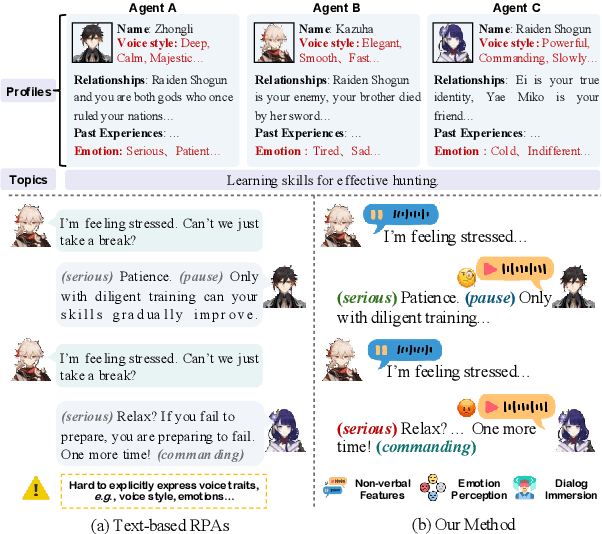



Abstract:Role-Playing Agents (RPAs), benefiting from large language models, is an emerging interactive AI system that simulates roles or characters with diverse personalities. However, existing methods primarily focus on mimicking dialogues among roles in textual form, neglecting the role's voice traits (e.g., voice style and emotions) as playing a crucial effect in interaction, which tends to be more immersive experiences in realistic scenarios. Towards this goal, we propose OmniCharacter, a first seamless speech-language personality interaction model to achieve immersive RPAs with low latency. Specifically, OmniCharacter enables agents to consistently exhibit role-specific personality traits and vocal traits throughout the interaction, enabling a mixture of speech and language responses. To align the model with speech-language scenarios, we construct a dataset named OmniCharacter-10K, which involves more distinctive characters (20), richly contextualized multi-round dialogue (10K), and dynamic speech response (135K). Experimental results showcase that our method yields better responses in terms of both content and style compared to existing RPAs and mainstream speech-language models, with a response latency as low as 289ms. Code and dataset are available at https://github.com/AlibabaResearch/DAMO-ConvAI/tree/main/OmniCharacter.
EPO: Explicit Policy Optimization for Strategic Reasoning in LLMs via Reinforcement Learning
Feb 18, 2025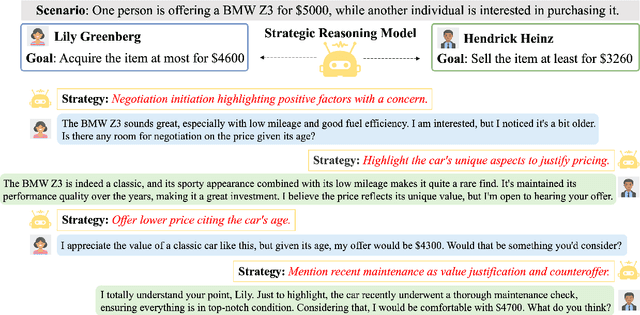
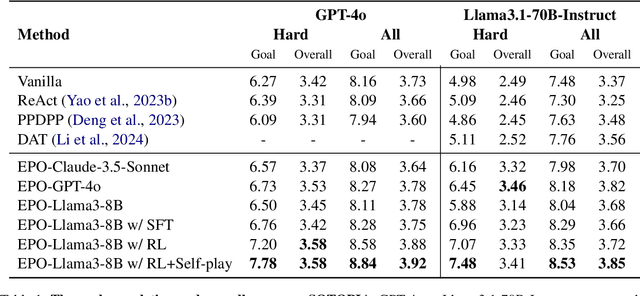
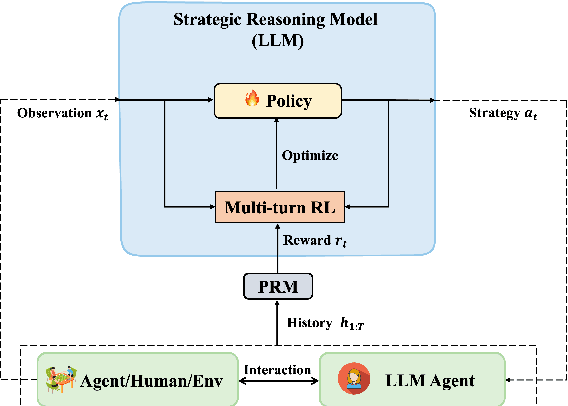

Abstract:Large Language Models (LLMs) have shown impressive reasoning capabilities in well-defined problems with clear solutions, such as mathematics and coding. However, they still struggle with complex real-world scenarios like business negotiations, which require strategic reasoning-an ability to navigate dynamic environments and align long-term goals amidst uncertainty. Existing methods for strategic reasoning face challenges in adaptability, scalability, and transferring strategies to new contexts. To address these issues, we propose explicit policy optimization (EPO) for strategic reasoning, featuring an LLM that provides strategies in open-ended action space and can be plugged into arbitrary LLM agents to motivate goal-directed behavior. To improve adaptability and policy transferability, we train the strategic reasoning model via multi-turn reinforcement learning (RL) using process rewards and iterative self-play, without supervised fine-tuning (SFT) as a preliminary step. Experiments across social and physical domains demonstrate EPO's ability of long-term goal alignment through enhanced strategic reasoning, achieving state-of-the-art performance on social dialogue and web navigation tasks. Our findings reveal various collaborative reasoning mechanisms emergent in EPO and its effectiveness in generating novel strategies, underscoring its potential for strategic reasoning in real-world applications.
OpenOmni: Large Language Models Pivot Zero-shot Omnimodal Alignment across Language with Real-time Self-Aware Emotional Speech Synthesis
Jan 08, 2025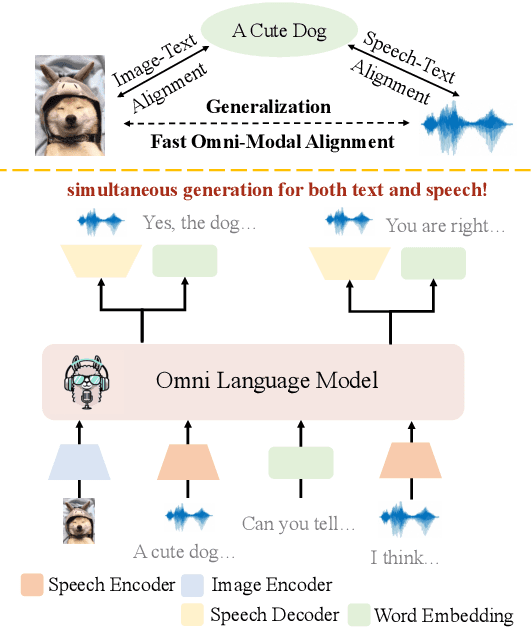



Abstract:Recent advancements in omnimodal learning have been achieved in understanding and generation across images, text, and speech, though mainly within proprietary models. Limited omnimodal datasets and the inherent challenges associated with real-time emotional speech generation have hindered open-source progress. To address these issues, we propose openomni, a two-stage training method combining omnimodal alignment and speech generation to develop a state-of-the-art omnimodal large language model. In the alignment phase, a pre-trained speech model is further trained on text-image tasks to generalize from vision to speech in a (near) zero-shot manner, outperforming models trained on tri-modal datasets. In the speech generation phase, a lightweight decoder facilitates real-time emotional speech through training on speech tasks and preference learning. Experiments demonstrate that openomni consistently improves across omnimodal, vision-language, and speech-language evaluations, enabling natural, emotion-rich dialogues and real-time emotional speech generation.
SDPO: Segment-Level Direct Preference Optimization for Social Agents
Jan 03, 2025



Abstract:Social agents powered by large language models (LLMs) can simulate human social behaviors but fall short in handling complex goal-oriented social dialogues. Direct Preference Optimization (DPO) has proven effective in aligning LLM behavior with human preferences across a variety of agent tasks. Existing DPO-based approaches for multi-turn interactions are divided into turn-level and session-level methods. The turn-level method is overly fine-grained, focusing exclusively on individual turns, while session-level methods are too coarse-grained, often introducing training noise. To address these limitations, we propose Segment-Level Direct Preference Optimization (SDPO), which focuses on specific key segments within interactions to optimize multi-turn agent behavior while minimizing training noise. Evaluations on the SOTOPIA benchmark demonstrate that SDPO-tuned agents consistently outperform both existing DPO-based methods and proprietary LLMs like GPT-4o, underscoring SDPO's potential to advance the social intelligence of LLM-based agents. We release our code and data at https://github.com/AlibabaResearch/DAMO-ConvAI/tree/main/SDPO.
 Add to Chrome
Add to Chrome Add to Firefox
Add to Firefox Add to Edge
Add to Edge